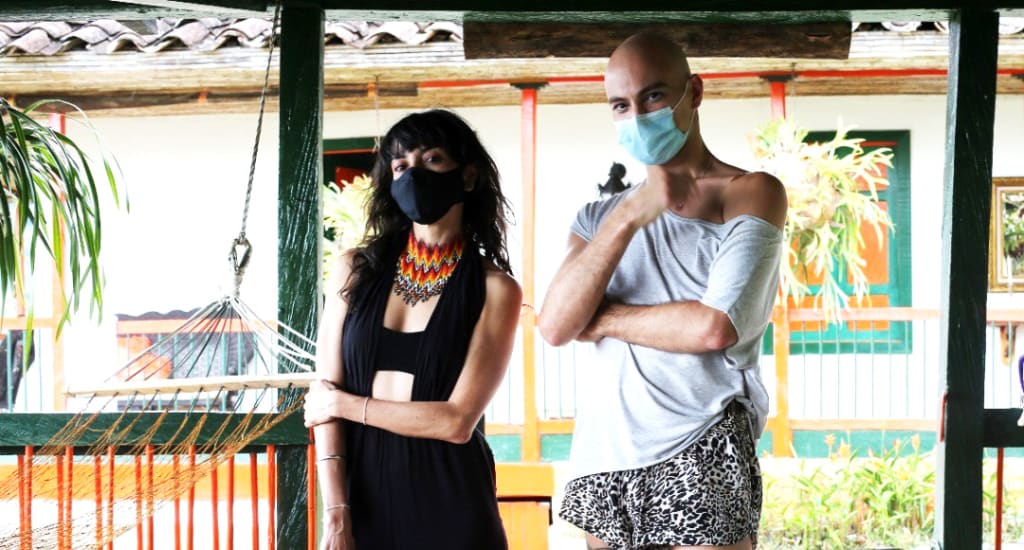Sacred Awera
A Conversation w/ Directors Natalia Escobar & Simon(e) Jaikiriuma Paetau

In 1492 began an onslaught against the Indigenous People of the Western World. The modern perception of the “ Western World “ is that it is the White World, it isn’t. The real Western World is the Indigenous People that have long occupied these Sacred Lands, the Natives that are as Indigenous to these areas as our mountains, creeks and plants. Like America, Colonization also runs deep in Columbia. In fact, it runs so deep that the name “ Columbia “ is a homage to genocidal murderer Christopher Columbus. Justified by the Church and Spaniard Monarchs, Columbus referenced Manifest Destiny as a means to eradicate Indigenous People or proselytize Indigenous People to create a home for Christianity. It is the largest genocide to ever occur and the one genocide that no one ever wants to discuss. All of the tribes of our lands have distinct tribal cultures with distinct customs but there are also many similarities. One of the biggest similarities is that most tribes had multiple genders before having the Gender Binary forced on us via forced assimilation and colonization.
Directors Natalia Escobar & Simon(e) Jaikiriuma Paetau created the film ‘ Aribada ‘ and hoped to show the strength, beauty and resilience of the Indigenous Columbian Trans Women from the Emberá tribes. Like many of the Two Spirit, LGBTQ2s & Indigenous Trans People of the North American Tribes, these Emberá women have fled from their tribal communities to create peace and a place where their humanity is seen. Colonization has long taught Indigenous People to reject our own familial bonds for anything that exists outside of the norm of the criteria of White Supremacy. The Patriarchy is not just the hatred of Cis Women. The Patriarchy is the hatred of all that is not Cis White Male Hyper-Masculine Heterosexual and Able-Bodied. As Indigenous People, we need to question who we were and what our customs were pre-contact, pre-genocide. Many of us Two Spirit and LGBTQ Indigenous People have been working endlessly to restore our sacred place by the fire, our sacred place within our tribal communities. When the Colonizers arrived, Two Spirits began to be fed to Wild Dogs as well as suffering other atrocities. Our tribal communities began to lie about our existence to protect us, not erase us. Doing that has left us with the issue of Two Spirits, LGBTQ and Gender Variant beings being forgotten for the sacred roles we played in most tribal communities. We were medicine people and healers who were recognized for our abilities to not only embody masculine/feminine spirits/energies but to be able to walk between these two oscillating energies that drive our bodies. For many traditional and decolonized native people, it is actually considered a blessing to have a Two Spirit in our family. What is long forgotten is that Indigenous People see more with our Spirit than our eyes. We have long perceived people on the basis of spirit value rather than face value. So who we are isn’t just based on one’s gender identity but also the gifts we carry and our responsibilities to our tribal communities.
Las Traviesa are hardworking coffee farmers and Artists. They are a symbol of pure Indigenous Female Strength. The term ‘ traviesa ‘ in context, is a name given to describe the perceived trickery and seduction of Trans Women in Columbia. The term ‘ Aweras ‘ is one used to describe the becoming of a woman in the sense of puberty. These are women who are coming into their own. They are women and only unlearning who colonization tells them they are allowed to be. Transitioning is about making our spirits comfortable in our own bodies. These bodies are just the metaphorical car that our spirits drive while we come to learn in the physical realm. Many Trans Women are also subject to the Male Gaze, the one that says our bodies are just here for pleasure and abuse. However, Trans experience transmisogyny from both cis male and females. The unsolicited make up tips, assumptions that trans identities are a performance and that we are at the way bottom of the societal pyramid structure. Society rarely discusses their need to have a punching bag or that they have a mob mentality. Indigenous Trans, Two Spirits and LGBTQ play an important role in the decolonization process. We are our authentic selves with our Indigeneity that burns inside of us so deeply and so true, it is impossible to be anything else. We are the ink on the paper that cannot be erased. As indigenous people, you can’t pick and choose what barbarous parts of colonization you’re okay to keep when you want to decolonize. It is an ongoing, never-ending process of unlearning and reclaiming who we were before who we were told who to be. Patriarchy yearns to have someone to abuse. There is not true feminism without intersectionality. One of our greatest forms of harm in America is White Feminism, a form of feminism that excludes the consciousness of intersectionality and where white women yearn to possess the power of Cis Straight Able-Bodied White Men.
In asking Natalia and Simon(e) what drew them to create ‘ Aribada, ‘ Natalia said “ I think it was meeting them and seeing them. Even though they were rejected from their communities, they escaped their original communities and found each other in this place. It became a shelter for them. They’ve been doing a lot of work to create the community that they are living in at the moment. Their work is very precarious. They work as coffee pickers and the pay is not very good. This community and work gives them a way to survive. It’s so interesting to meet them and realize all of the hard work they have being doing against all of the odds. Columbia is not the easiest place to be a Woman or a Trans Woman. “ One of the many good things about Indigenous People, is our resiliency and our ability to always survive. Creating this community as an avenue of survival and existence for Las Traviesas is an Indigenous survival response. Simon(e) replied “ I knew about Las Traviesas though presentations. There was Trans visibility but the visibility of Queer and Trans People is always a double-edged sword. I thought that it was super important to do a visual counter perspective. At the Artist Residency, we went without a colonial perception of what it was going to be. We wanted to know what can queer decolonial aesthetic be? It was really important to create a queer decolonial perspective. The process shifted of what we thought we knew and there was so much unlearning we had to do. " These two directors met in a Latinx community in Berlin where they developed a mutual respect for each other’s work. Both are fierce Artists, Creators and minds in their own right. This dynamic duo has come to share the truth and beauty of Las Traviesas, to amplify their voices and as Simon(e) so eloquently said “ telling the story through our four eyes. “
Natalia Escobar is an interdisciplinary artist working between the worlds of music and film. Her powerful works are shared in her Poison Arrow project. What has pulled me in is the lush seduction of her rebellious sound. The music cradles me, soothes me and frees me all at the same time. I first became familiar with her work through the project Pierce With Arrow with Troy Pierce. Their pulsing magick and wicker so bright, their sounds hold a very special place in my record collection. What originally caught my attention, outside of being a longtime fan of Troy Pierce and Natalia’s ethereal vocal rebellion was the presence of an Indigenous Trans Woman in their music video. Natalia said “ We reimagined the notion of Narcissus, what we think it is now. It was about self-reflection and self-love without the negative connotation. We worked with Aza, she wanted to be Narcissus and depict Narcissus as a Trans Woman. “ What better way to embody self-love than that of a Trans Woman trying to love what we see in the mirror in a world that is constantly trying to convince us to hate ourselves. This relationship with the world and my body as an Indigenous Trans Woman has left me with not only a difficult relationship with food but many years of learning to love myself and embrace even the parts of myself society doesn’t want to allow me to love. Words spoken from Zamanta Enevia rang so true that my eyes began to water themselves. She spoke an important Indigenous Trans truth “ we feel like we have fallen from time. “ The Indigenous experience of survival of physical, cultural, paper and identity genocide that has never ended since it began in 1492 is that time was stolen from us. Reservations are nothing more than concentration camps that in the present day, Indigenous People are granted permission to travel from or even escape. We see our Indigenous Relatives south of the border risking their lives regularly to try to find a better life in America. Survivors of Residential/Boarding Schools whose hair was cut off so we’d lose connection to Mother Earth. Us Natives in present days trying to learn the languages that were stolen from us, that were burned. Languages we’ve only been legally able to speak again for a few decades - despite the fact of the important roles played by Navajo Code Talkers during World War II. We have been stolen from time and as a non-native, you may not see it now but everything we do is us trying to survive in a world that wants us erased.
Simon(e) Jaikiuriuma Paetau is a multidisciplinary artist working between cinema, performance and film. Simon(e)’s drive, passion, dedication and vision makes her an asset to not just film and art but to Native Resilience. I asked her to share more about herself with us and she said “ I began creating in 2010. I started in a Cuban Film School and I was thrown into the world of Transferismo, the drag queen underground. I got to ask myself personal questions about my identity and about my queerness. I was always hiding behind the camera and slowly trying to make myself more visible. I need more than just cinema and started to do performance. I just did an installation about Trans women. There has always been punishment of our bodies, that projection on to us creates this violence. ’ Aribada ‘ is about a monster that eats other people, eats things. Is the Aribada about exclusion ? “ We spoke about the needs for ‘ Mestizos ‘ decolonizing and their need to reconnect with their Native roots that were stolen from them. “ I wanted to create a memory for the ‘ Mestizos ‘ who have been denied their indigeneity from colonization “ said Simon(e). She said that Las Traviesas strategically use the term ‘ traviesa ‘ as a political gesture. “ It is really important to be a part of a conscious discussion about diverse indigenous gender identities. How can we create alliances in these discussions? They have for the time a focus on the struggle of queer and Trans issues. There needs to be discourse where the different tribes connect. There is a lack of connectivity between the tribes because of colonization. They erase the queer Indigenous Voices “ said Simon(e). This dynamic duo of Escobar & Paetau have proven themselves a strong force in Indigenous Survival. Their Incentive and common goal is that of Indigenous Survival and there is no Indigenous Survival without Indigenous Trans, Two Spirit and LGBTQ beings. We are not some new idea imposed by colonization. Indigenous Two Spirit, Trans, LGBTQ and Gender Variant beings have long been here. We have long been Sacred and we have long been traditional in most tribes.
Las Traviesas hope to accomplish much more than just having a place of peace, a place to exist and a way to sustain themselves. These beautiful strong Indigenous Women want to have “ political and juridicial recognition by the Columbian state and the Emberá governor council for their community “ said Escobar. They want to be recognized for the community they continue to create. “ Their desire to demonstrate that there are other ways to be an Emberá woman made us ask ourselves; how can we make a project that could contribute to the strengthening of their community ties and identity processes “ said Escobar. ‘ Aribada ‘ was featured at the Cannes Film Festival. Directors Natalia Escobar and Simon(e) Jaikiriuma Paetau have received awards and recognition for their hard work.
by Marcy Angeles: Artist, Writer, Musician, Journalist & Public Speaker
About the Creator
Marcy Angeles
Marcy Angeles is a Disabled Two-Spirit Nednhi Apache & Guamares Band of Chichimeca writer, painter, musician, dj and freelance journalist from Southern New Mexico.
Enjoyed the story? Support the Creator.
Subscribe for free to receive all their stories in your feed. You could also pledge your support or give them a one-off tip, letting them know you appreciate their work.






Comments
There are no comments for this story
Be the first to respond and start the conversation.